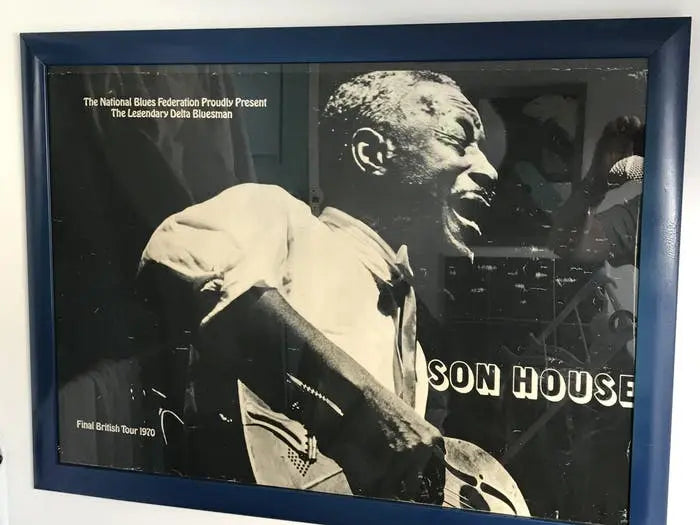Son House at Leith Town Hall 1970, by David Beckett: Glasgow Music Walking Tours Guest Blog
We’ve been enjoying the return to live music in Glasgow and Edinburgh recently and wanted to share a blog from friend of the music tours, David Beckett, about the time the legendary Son House played Leith Town Hall. Over to David…
I was barely into a year of what turned out to be a fifty (plus) year-old love affair with the Blues, when the legendary Delta Bluesman, Son House, embarked on his final UK tour. This was in the early summer months of 1970 and one of the tour dates was the Leith Town Hall in Edinburgh on the 8th of July. I knew little of Son House other than he was a Bluesman. It would be many years later before I would learn the important role that Eddie “Son” House had played in the history of Blues music: Melody Maker headlined this tour as “Your last chance to see the Son”.
Along with two friends, I set off from Glasgow Queen Street Station on a beautiful warm, sunny evening. The train was the old-fashioned type with compartments and a linking corridor along the side. Getting off at Edinburgh Waverley I noticed two other guys heading in the same direction as us. One was carrying a guitar case and the other sported an amazing mane of dark, bushy hair. More on them later. Without really knowing where we were going, we headed down the full length of Leith Walk and started asking for directions to the Town Hall. On arrival we took our seats in the second row and had a perfect view of the stage. We were so excited that I can’t remember the supporting acts. I have since read who they were and wished I’d paid attention. The performers included the late Jo Ann Kelly. She was a wonderful Blues guitarist with a voice straight out of the Mississippi Delta, despite coming from Streatham in London. Jo Ann’s brother Dave also played, an accomplished guitarist who plays with the likes of the Blues Band among others. Shetland’s Aly Bain was also on the bill. Local band East West featured; they were a regular favourite at the Maryland Club in Glasgow where I worked.
Son House took the stage to rapturous applause, clearly, we were sitting with an informed and appreciative audience. I had only heard music like this on record and very old recordings at that. Son House was now sixty-eight years of age and had been rediscovered during the early ’60s as the folk revival of that period shifted into top gear. What grabbed me immediately was the rich intensity and emotion of his singing voice. He accompanied himself on National Steel Guitar which he slammed with his fingers and a copper slide moving up and down the fretboard creating that eerie incandescent sound of the Mississippi Delta.
The set included the deepest and most soulful renditions of ‘Levee Camp Moan’ and ‘Death Letter Blues’. Son House was a committed Baptist preacher as well as a Bluesman and his set included some a capella like ‘This Light of Mine’ and the call and response of ‘John the Revelator’, which he reprised for an encore, with the audience on their feet, stamping, clapping and roaring in response.
Many years later I read that the model of guitar Son played on that tour was a 1930’s National Duolian. Apparently, Eric Clapton sold a similar model at auction in 1999 for $42250! During the four-week tour, Son recorded a session for John Peel’s radio show on Radio One and recorded a live album at London’s 100 Club: he also appeared at the Montreux Jazz Festival in Switzerland.
So where does Son House fit into Blues history? He was born in Lyon Mississippi in 1902 and was a contemporary of Charley Patton, Willie Brown and Robert Johnson. It has been said that he was the instigator of the Faustian myth that Robert Johnson had sold his soul to the devil at the crossroads at midnight. He recorded a handful of songs in the 1930s and in the ’40s Alan Lomax recorded a couple of dozen songs. Son and Willie Brown played juke joints and Saturday night fish frys up and down the Delta for nickels and dimes. He would have been paid a flat rate for his recordings. There were no royalty payments for African American performers in those days.
In 1965, Son House was a guest in Muddy Waters’ dressing room when one of Muddy’s band members began to poke fun at Son. Muddy quickly remonstrated with the band member saying “Don’t be making fun of him. When I was a boy coming up that man was king, you hear me? That man was king. Here you are mocking and making fun of him. If it wasn’t for that man, you wouldn’t be here because you wouldn’t have a job because I wouldn’t be here. Don’t you ever make fun of that man: he was king when I was coming up”.
After the Leith Town Hall gig as I clutched my souvenir tour poster in the compartment of the Glasgow-bound train we were joined by the guitar carrying guy and his long-haired mate whom I had spied on the outward journey. The long-haired guy turned out to be none other than Fraser Speirs, who later became a colleague of mine at the Maryland. Of course, Fraser now has the distinction of being Glasgow’s own first-class Blues harp player. I’m very glad to say that I still have the tour poster and that it has adorned the wall of every house I have lived in since 1970. I’m now nearly at the age Son House was when I saw him and am so glad to be blessed with a memory to appreciate that experience. Yes, with recordings and the internet we can experience music from the Mississippi Delta of the 1930s, but nothing will surpass the exhilaration I felt that evening in Leith Town Hall.
“Tell me who’s that writin’? John the Revelator,
Tell me who’s that writin’? John the Revelator,
Tell me who’s that writin’? John the Revelator, he wrote the Book of the Seven Seals”
David Beckett
This content was originally published here.

